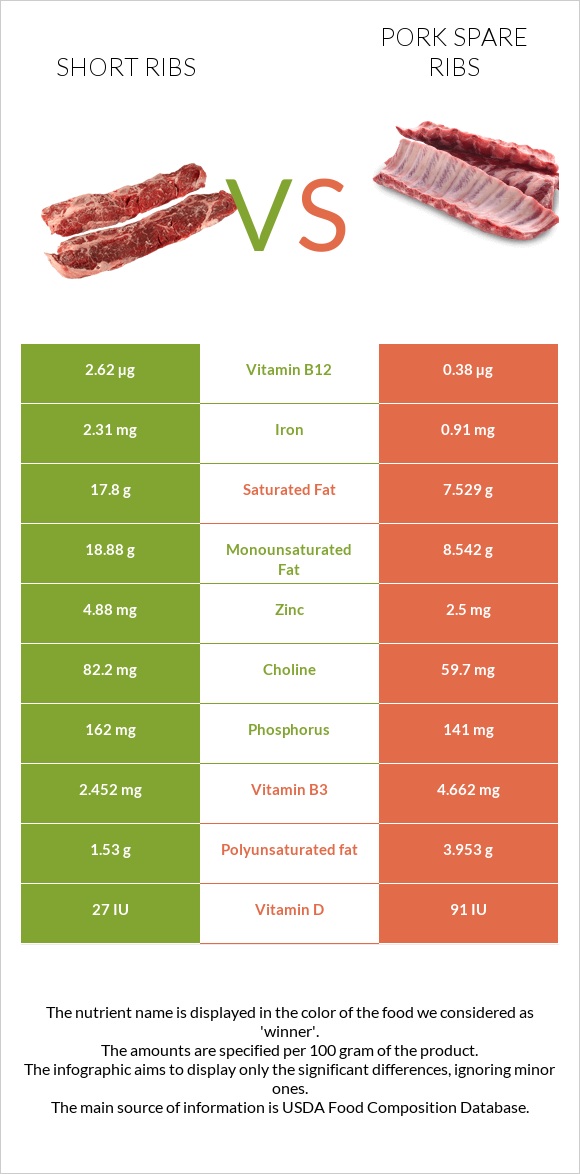Short ribs vs. Pork spare ribs — In-Depth Nutrition Comparison
Compare
What are the main differences between short ribs and pork spare ribs?
- Short ribs are richer in vitamin B12, zinc, and iron, while pork spare ribs are higher in vitamin B6, vitamin B1, vitamin B3, vitamin D, vitamin B2, and vitamin B5.
- Short ribs' daily need coverage for vitamin B12 is 93% higher.
- Pork spare ribs have 3 times less iron than short ribs. Short ribs have 2.31mg of iron, while pork spare ribs have 0.91mg.
- Pork spare ribs are lower in saturated fat.
We used Beef, rib, shortribs, separable lean, and fat, choice, cooked, braised and Pork, fresh, spareribs, separable lean, and fat, raw types in this comparison.
Infographic

Infographic link
Mineral Comparison
Mineral comparison score is based on the number of minerals by which one or the other food is richer. The "coverage" charts below show how much of the daily needs can be covered by 300 grams of the food.
| Contains more IronIron | +153.8% |
| Contains more CopperCopper | +23.8% |
| Contains more ZincZinc | +95.2% |
| Contains more PhosphorusPhosphorus | +14.9% |
| Contains less SodiumSodium | -38.3% |
| Contains more ManganeseManganese | +30% |
| Contains more CalciumCalcium | +25% |
Vitamin Comparison
Vitamin comparison score is based on the number of vitamins by which one or the other food is richer. The "coverage" charts below show how much of the daily needs can be covered by 300 grams of the food.
| Contains more Vitamin B12Vitamin B12 | +589.5% |
| Contains more Vitamin KVitamin K | +∞% |
| Contains more FolateFolate | +∞% |
| Contains more Vitamin EVitamin E | +27.6% |
| Contains more Vitamin DVitamin D | +228.6% |
| Contains more Vitamin B1Vitamin B1 | +538% |
| Contains more Vitamin B2Vitamin B2 | +67.3% |
| Contains more Vitamin B3Vitamin B3 | +90.1% |
| Contains more Vitamin B5Vitamin B5 | +148% |
| Contains more Vitamin B6Vitamin B6 | +160.9% |
All nutrients comparison - raw data values
| Nutrient |  |
 |
DV% diff. |
| Vitamin B12 | 2.62µg | 0.38µg | 93% |
| Saturated fat | 17.8g | 7.529g | 47% |
| Fats | 41.98g | 23.4g | 29% |
| Vitamin B6 | 0.22mg | 0.574mg | 27% |
| Monounsaturated fat | 18.88g | 8.542g | 26% |
| Zinc | 4.88mg | 2.5mg | 22% |
| Vitamin B1 | 0.05mg | 0.319mg | 22% |
| Iron | 2.31mg | 0.91mg | 18% |
| Polyunsaturated fat | 1.53g | 3.953g | 16% |
| Vitamin B3 | 2.452mg | 4.662mg | 14% |
| Protein | 21.57g | 15.47g | 12% |
| Calories | 471kcal | 277kcal | 10% |
| Vitamin D | 27 IU | 91 IU | 8% |
| Vitamin D | 0.7µg | 2.3µg | 8% |
| Vitamin B2 | 0.15mg | 0.251mg | 8% |
| Vitamin B5 | 0.252mg | 0.625mg | 7% |
| Cholesterol | 94mg | 80mg | 5% |
| Choline | 82.2mg | 59.7mg | 4% |
| Phosphorus | 162mg | 141mg | 3% |
| Copper | 0.099mg | 0.08mg | 2% |
| Selenium | 20.8µg | 22µg | 2% |
| Vitamin K | 2.4µg | 0µg | 2% |
| Potassium | 224mg | 242mg | 1% |
| Sodium | 50mg | 81mg | 1% |
| Vitamin E | 0.29mg | 0.37mg | 1% |
| Folate | 5µg | 0µg | 1% |
| Magnesium | 15mg | 16mg | 0% |
| Calcium | 12mg | 15mg | 0% |
| Manganese | 0.013mg | 0.01mg | 0% |
| Trans fat | 0.222g | N/A | |
| Tryptophan | 0.142mg | 0.163mg | 0% |
| Threonine | 0.862mg | 0.695mg | 0% |
| Isoleucine | 0.981mg | 0.761mg | 0% |
| Leucine | 1.716mg | 1.318mg | 0% |
| Lysine | 1.823mg | 1.435mg | 0% |
| Methionine | 0.562mg | 0.426mg | 0% |
| Phenylalanine | 0.852mg | 0.65mg | 0% |
| Valine | 1.07mg | 0.809mg | 0% |
| Histidine | 0.688mg | 0.668mg | 0% |
| Omega-3 - EPA | 0.003g | 0g | N/A |
| Omega-3 - DHA | 0.001g | 0g | N/A |
| Omega-3 - ALA | 0.081g | N/A | |
| Omega-3 - DPA | 0.016g | 0g | N/A |
| Omega-6 - Eicosadienoic acid | 0.079g | N/A | |
| Omega-6 - Linoleic acid | 3.146g | N/A |
Macronutrient Comparison
Macronutrient breakdown side-by-side comparison
Protein:
21.57 g
Fats:
41.98 g
Carbs:
0 g
Water:
35.72 g
Other:
0.73 g
Protein:
15.47 g
Fats:
23.4 g
Carbs:
0 g
Water:
59.75 g
Other:
1.38 g
| Contains more ProteinProtein | +39.4% |
| Contains more FatsFats | +79.4% |
| Contains more WaterWater | +67.3% |
| Contains more OtherOther | +89% |
~equal in
Carbs
~0g
Fat Type Comparison
Fat type breakdown side-by-side comparison
Saturated fat:
Sat. Fat
17.8 g
Monounsaturated fat:
Mono. Fat
18.88 g
Polyunsaturated fat:
Poly. Fat
1.53 g
Saturated fat:
Sat. Fat
7.529 g
Monounsaturated fat:
Mono. Fat
8.542 g
Polyunsaturated fat:
Poly. Fat
3.953 g
| Contains more Mono. FatMonounsaturated fat | +121% |
| Contains less Sat. FatSaturated fat | -57.7% |
| Contains more Poly. FatPolyunsaturated fat | +158.4% |





